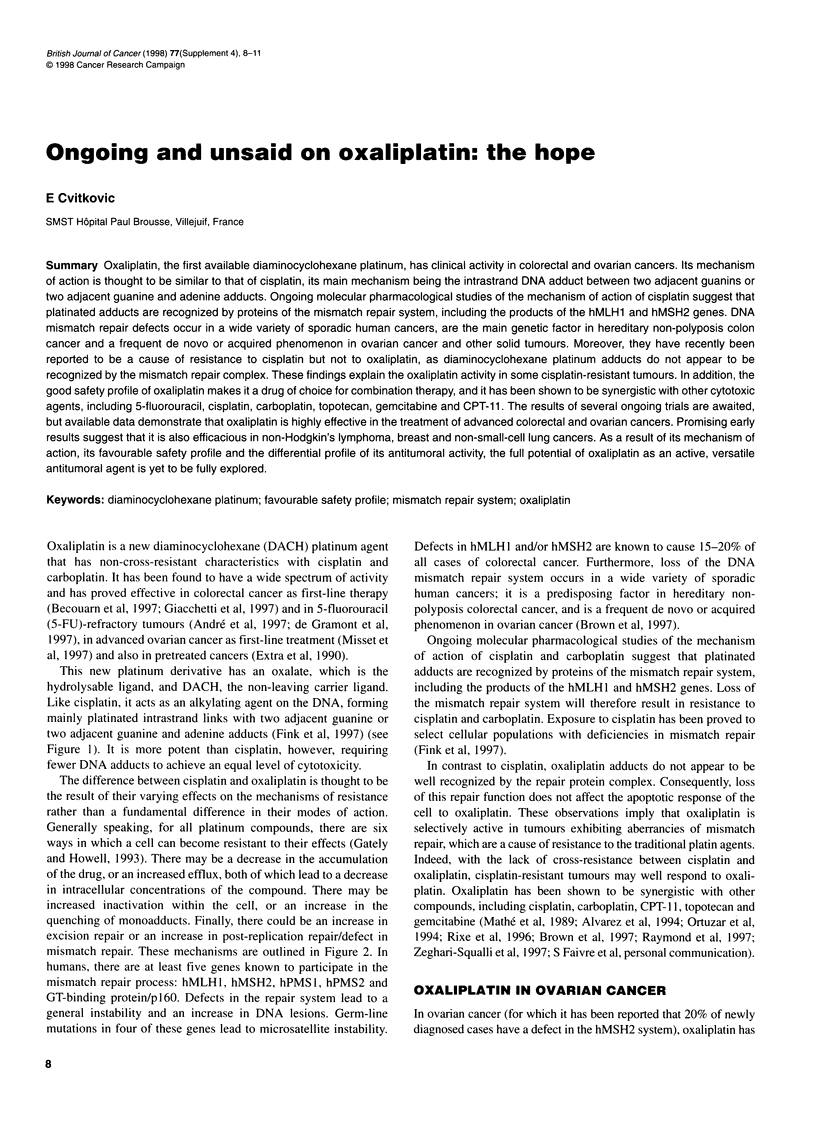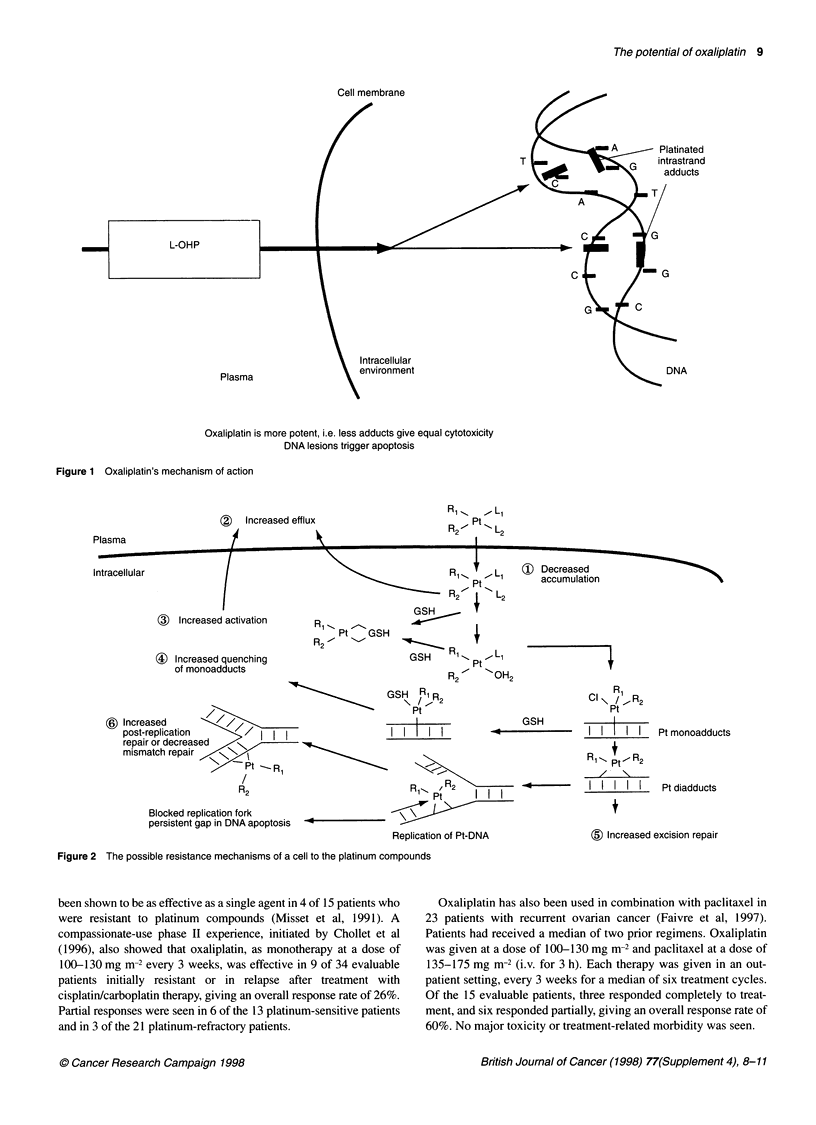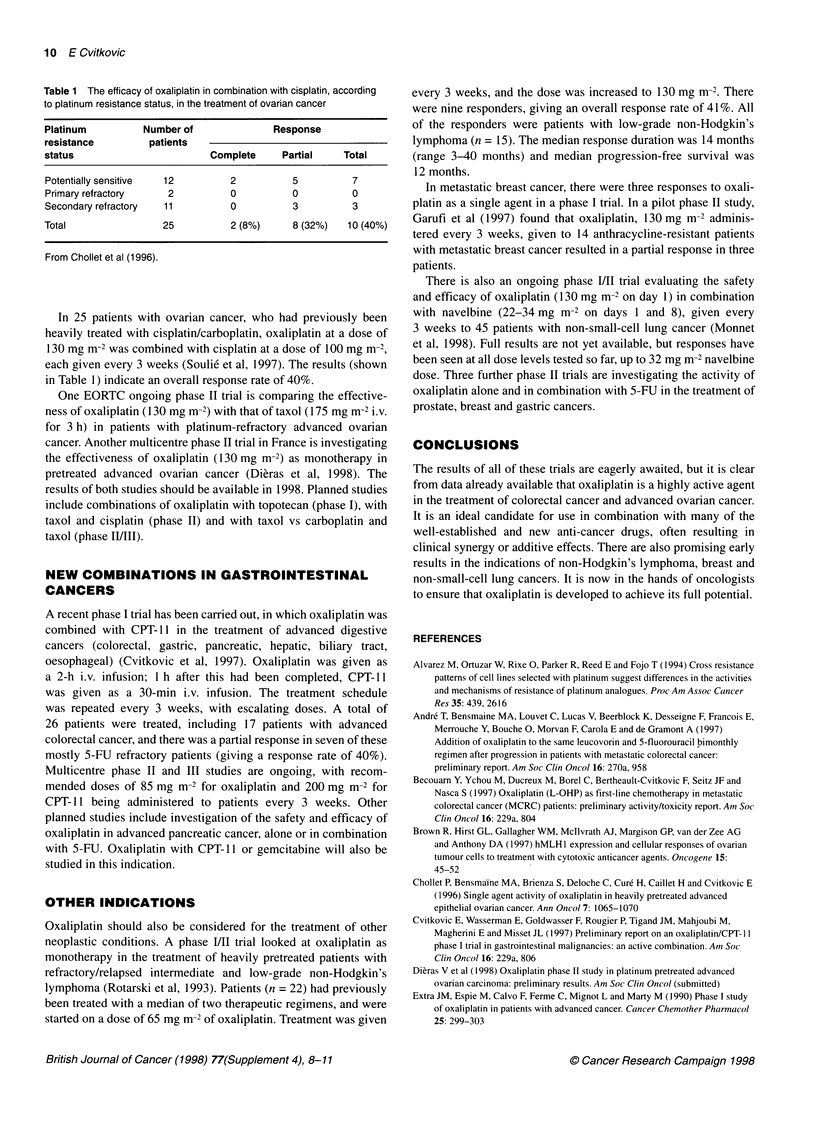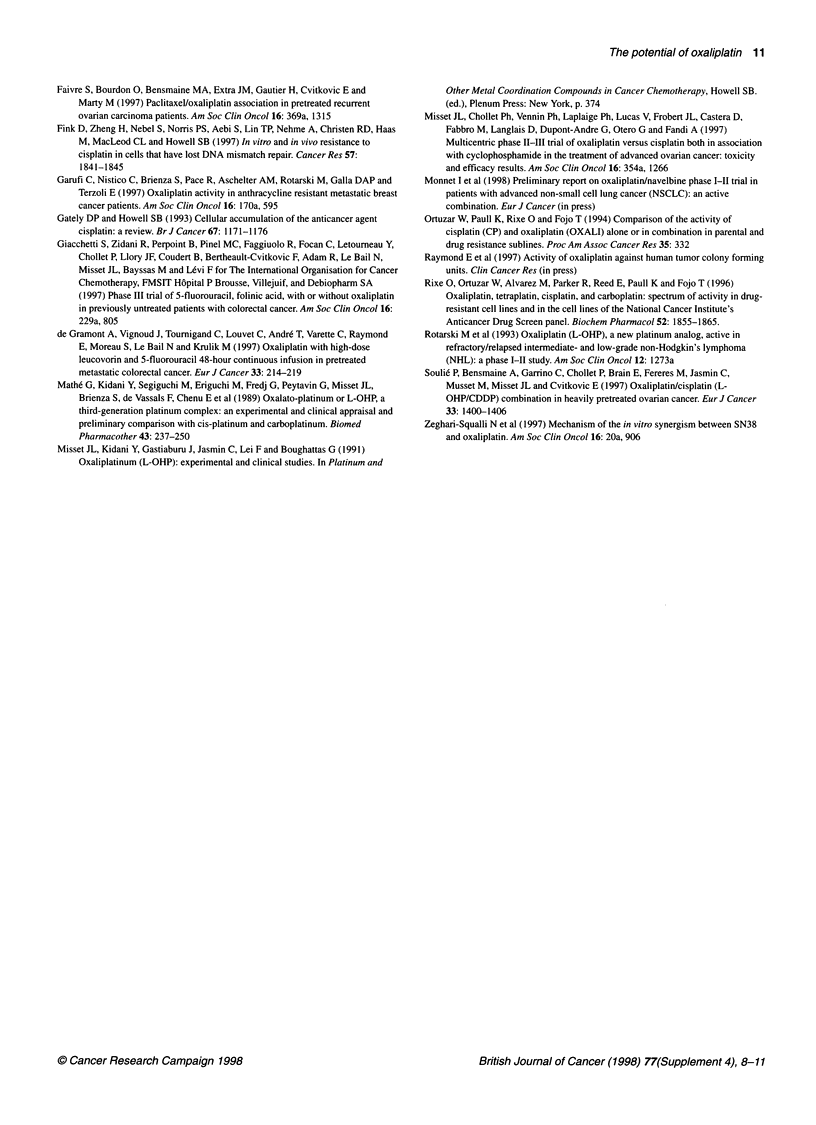Abstract
Oxaliplatin, the first available diaminocyclohexane platinum, has clinical activity in colorectal and ovarian cancers. Its mechanism of action is thought to be similar to that of cisplatin, its main mechanism being the intrastrand DNA adduct between two adjacent guanins or two adjacent guanine and adenine adducts. Ongoing molecular pharmacological studies of the mechanism of action of cisplatin suggest that platinated adducts are recognized by proteins of the mismatch repair system, including the products of the hMLH1 and hMSH2 genes. DNA mismatch repair defects occur in a wide variety of sporadic human cancers, are the main genetic factor in hereditary non-polyposis colon cancer and a frequent de novo or acquired phenomenon in ovarian cancer and other solid tumours. Moreover, they have recently been reported to be a cause of resistance to cisplatin but not to oxaliplatin, as diaminocyclohexane platinum adducts do not appear to be recognized by the mismatch repair complex. These findings explain the oxaliplatin activity in some cisplatin-resistant tumours. In addition, the good safety profile of oxaliplatin makes it a drug of choice for combination therapy, and it has been shown to be synergistic with other cytotoxic agents, including 5-fluorouracil, cisplatin, carboplatin, topotecan, gemcitabine and CPT-11. The results of several ongoing trials are awaited, but available data demonstrate that oxaliplatin is highly effective in the treatment of advanced colorectal and ovarian cancers. Promising early results suggest that it is also efficacious in non-Hodgkin's lymphoma, breast and non-small-cell lung cancers. As a result of its mechanism of action, its favourable safety profile and the differential profile of its antitumoral activity, the full potential of oxaliplatin as an active, versatile antitumoral agent is yet to be fully explored.
Full text
PDF



Selected References
These references are in PubMed. This may not be the complete list of references from this article.
- Brown R., Hirst G. L., Gallagher W. M., McIlwrath A. J., Margison G. P., van der Zee A. G., Anthoney D. A. hMLH1 expression and cellular responses of ovarian tumour cells to treatment with cytotoxic anticancer agents. Oncogene. 1997 Jul 3;15(1):45–52. doi: 10.1038/sj.onc.1201167. [DOI] [PubMed] [Google Scholar]
- Chollet P., Bensmaïne M. A., Brienza S., Deloche C., Curé H., Caillet H., Cvitkovic E. Single agent activity of oxaliplatin in heavily pretreated advanced epithelial ovarian cancer. Ann Oncol. 1996 Dec;7(10):1065–1070. doi: 10.1093/oxfordjournals.annonc.a010500. [DOI] [PubMed] [Google Scholar]
- Fink D., Zheng H., Nebel S., Norris P. S., Aebi S., Lin T. P., Nehmé A., Christen R. D., Haas M., MacLeod C. L. In vitro and in vivo resistance to cisplatin in cells that have lost DNA mismatch repair. Cancer Res. 1997 May 15;57(10):1841–1845. [PubMed] [Google Scholar]
- Gately D. P., Howell S. B. Cellular accumulation of the anticancer agent cisplatin: a review. Br J Cancer. 1993 Jun;67(6):1171–1176. doi: 10.1038/bjc.1993.221. [DOI] [PMC free article] [PubMed] [Google Scholar]
- Mathé G., Kidani Y., Segiguchi M., Eriguchi M., Fredj G., Peytavin G., Misset J. L., Brienza S., de Vassals F., Chenu E. Oxalato-platinum or 1-OHP, a third-generation platinum complex: an experimental and clinical appraisal and preliminary comparison with cis-platinum and carboplatinum. Biomed Pharmacother. 1989;43(4):237–250. doi: 10.1016/0753-3322(89)90003-6. [DOI] [PubMed] [Google Scholar]
- Rixe O., Ortuzar W., Alvarez M., Parker R., Reed E., Paull K., Fojo T. Oxaliplatin, tetraplatin, cisplatin, and carboplatin: spectrum of activity in drug-resistant cell lines and in the cell lines of the National Cancer Institute's Anticancer Drug Screen panel. Biochem Pharmacol. 1996 Dec 24;52(12):1855–1865. doi: 10.1016/s0006-2952(97)81490-6. [DOI] [PubMed] [Google Scholar]
- Soulié P., Bensmaïne A., Garrino C., Chollet P., Brain E., Fereres M., Jasmin C., Musset M., Misset J. L., Cvitkovic E. Oxaliplatin/cisplatin (L-OHP/CDDP) combination in heavily pretreated ovarian cancer. Eur J Cancer. 1997 Aug;33(9):1400–1406. doi: 10.1016/s0959-8049(97)00122-6. [DOI] [PubMed] [Google Scholar]
- de Gramont A., Vignoud J., Tournigand C., Louvet C., André T., Varette C., Raymond E., Moreau S., Le Bail N., Krulik M. Oxaliplatin with high-dose leucovorin and 5-fluorouracil 48-hour continuous infusion in pretreated metastatic colorectal cancer. Eur J Cancer. 1997 Feb;33(2):214–219. doi: 10.1016/s0959-8049(96)00370-x. [DOI] [PubMed] [Google Scholar]


